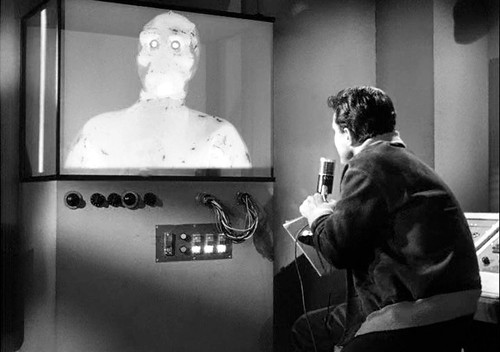O is for … Old Technology
My beloved netbook is in a sorry state. It has been languishing for quite a while, becoming more and more depressed as it realised it could not compete with my iPad in terms of cool-ness. In the end, it was too lethargic to fire up at all, and attempts to run it direct from the mains were met with a cold snub.
Well, I bought it a new battery, and a new mains charger. I thought it would be pleased, and to an extent, it was. It actually works now, which is a novelty. However, depression or resentment runs deep, and it refuses to work for any longer than two hours on a full charge, instead of its original seven or eight.
What to do?
 SOMEONE will find a use for it! 1963 - "The Outer Limits" The Galaxy Being, by James Vaughn http://www.flickr.com/photos/x-ray_delta_one/We live in an era when anything older than the current model is, well, old. There’s a lot to be said for buying new technology in school, but there’s a lot you can do with the older stuff too. Take my sorry netbook. I have discovered that 2 hours is all I need to write outline plans or articles, as I work in a café or in the garden. And unlike the iPad, I can type fast on its integrated keyboard, something I can’t do as well bashing away on a screen. What’s more, I don’t need the separate bluetooth keyboard I use in conjunction with the iPad, which is good, but adds to the bulk and weight I have to lug around.
SOMEONE will find a use for it! 1963 - "The Outer Limits" The Galaxy Being, by James Vaughn http://www.flickr.com/photos/x-ray_delta_one/We live in an era when anything older than the current model is, well, old. There’s a lot to be said for buying new technology in school, but there’s a lot you can do with the older stuff too. Take my sorry netbook. I have discovered that 2 hours is all I need to write outline plans or articles, as I work in a café or in the garden. And unlike the iPad, I can type fast on its integrated keyboard, something I can’t do as well bashing away on a screen. What’s more, I don’t need the separate bluetooth keyboard I use in conjunction with the iPad, which is good, but adds to the bulk and weight I have to lug around.
All of which is a long-winded way of saying that there is always a use for old or older technology in schools, such as:
- Areas of the school where the fastest or most powerful technology is not required; for example, you don’t need a super computer for plain-ish writing or simple spreadsheet work;
- Subjects where much-loved software won’t run on the latest operating system; for example, in one school I worked in, the Special Educational Needs department refused to have their computers upgraded, because all the programmes they found useful would have been rendered useless;
- I once gave an older computer to the art department, so students could do research on it when they wished to; being an old computer, it didn’t matter much if it became splashed with paint!
- Sometimes teachers or pupils would be happy to have a computer, or an extra computer, for home use;
- If nothing else, examples of older technology can be made into a permanent display of the development of computer technology, which can also be used for teaching purposes.
I am sure you can think of many other potential uses for older equipment.
There are a few “rules” concerning the dispersal of older equipment though:
- Don’t retain the older stuff for use in Computing or ICT, and give the newer stuff away. I have seen this done, and I think it is misguided, for two reasons. First, I think it’s important to demonstrate that Computing/ICT is up-to-date. Of all subject areas, this one really does have to walk the talk. Would you buy a Rolls Royce from a car salesman who drove around in an older and cheaper alternative? Second, if you can get by on older computers, why should the Headteacher give you any money to buy more?
- Don’t over-sell it. If it really is good only for playing music CDs on, then say so. People should know exactly what you’re offering them, so you know it will go where it’s wanted, and where it will, therefore, be used.
- Don’t offer it to colleagues on the basis that you’re trying to palm off old stuff onto them. Maybe you do need to make room for the spanking new equipment you’ve purchased, but you are offering them the opportunity to use perfectly serviceable stuff, as opposed to shoving it in a cupboard or, worse, a skip. (If you really do have to dump it, do so in a responsible way, taking into account the laws concerning the throwing away of electrical equipment.)
- Tell people about it. Celebrate the fact that nothing goes to waste as far as you are concerned!
That last point is definitely a plus as far as people visiting the school is concerned. It conveys the message that money isn’t wasted by continually replacing perfectly good older stuff with new stuff just for the sake of looking brand new.
And if good work is being done with all that older stuff, it will give the all-important message to colleagues visiting from other schools that you don’t always need the latest and smartest technology in order to transform teaching and learning.
